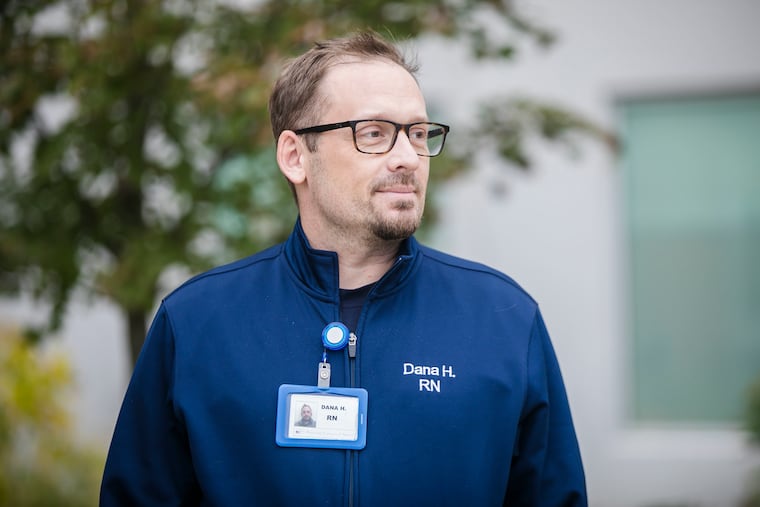For families of people in addiction, telling their stories can be a part of the healing process
Addiction treatment providers around the region say involving families in a patient’s treatment can also help the family unit recover.

Dana Henderson doesn’t often tell the story of his recovery.
It’s partially that Henderson, 38, of Summit, N.J. — now an intake nurse at a Recovery Centers of America addiction treatment facility — doesn’t like to draw attention to himself. It’s partially that he still isn’t sure how to tell the story of how he developed, and eventually recovered from, an addiction to the prescription medication Adderall that began in his early 20s.
But last year, when his mother, Linda Henderson, began writing down her recollections of the difficult years he spent in and out of addiction, Dana knew that process was how his mother started to heal.
The Hendersons’ different approaches to their stories show how differently patients and their families can experience addiction treatment and recovery — how what’s therapeutic for one family member may not be part of the process for another. Addiction treatment providers around the region say involving families in a patient’s treatment can also help the family unit recover.
“There’s a parallel process — a family has to start their own journey of recovery while their loved one is starting theirs,” said Trish Caldwell, RCA’s vice president of family and clinical programming. “How do you help support yourself in a way that allows you to support your loved one?”
Four years ago, Caldwell started a weekend-long program at RCA, Seeds of Recovery, designed to educate family members of patients on what their loved ones were going through.
“The field has a history of not involving families — they’re in the shadows, scared, alone. It keeps their loved ones and themselves from reconnecting. But recovery is strengthened when [patients] have people that believe in them and support them,” she said.
Brad Sorte, CEO at Caron Treatment Centers, said his own experience in early recovery — where he and his family worked together with a therapist — reinforced the importance of caring for the family members of a person in addiction, as well.
“For me, it’s been really important to work with families, because someone had the courage to do that for me,” he said.
Both Sorte and Caldwell want to move away from outdated, stigmatized language about families and addiction, such as references to “codependent” or “enabling.” Instead, they work on helping families set healthy boundaries and talk about addiction as a chronic disease, not a moral failing.
That realization was key for Linda Henderson in the early days of her son’s recovery, she said. “People said to throw him out. I found [what helped] to be the absolute opposite,” she said. “[Our kids] need everything they can get to help them. My whole message is, don’t give up on your loved ones.”
It’s something patients are eager to impart to their families, as well, Caldwell said. “When we have these conversations, patients will say, ‘Are you telling my family these things?’ They want them to understand what the disease model looks like. They want their families to understand that [their addiction didn’t happen] ‘because we don’t love you.’”
For Linda Henderson, writing her recollections of her son’s addiction was like piecing together a puzzle. As she wrote, she said, she recognized signs that Dana was struggling that she’d missed at the time. She also noticed setbacks that made the family’s journey harder, such as her own lack of a support system, and the inadequacy of Dana’s first time in rehab: The family’s insurance covered just 11 days of inpatient treatment.
“I just felt like this whole thing had been broiling inside me for years. I have to get this out. I have to write it down,” she said. Eventually, she turned her writing into a book, Wake Up, Mom, about the family’s experience with addiction, hoping that it could help other families.
Though Dana is supportive of the project, and participated in a question-and-answer section at the end of the book that fills in some of the gaps in his mother’s recollections, he’s read Wake Up, Mom only once.
“I have my own recovery, and my own way of staying sober, and I know my account of it,” Dana said. “[The book] is my mom’s interpretation. It’s therapy for her — knowing she’s making something good out of something horrible.”
Earlier this year, Linda spoke at a virtual Seeds of Recovery event — during the pandemic, the program has been held online every third Saturday. It was an especially meaningful experience, she said, because Dana works at an RCA facility — but was also treated for addiction there during his third, successful attempt at achieving recovery.
For Dana, a crucial part of his recovery story is that it’s not finished — something his mother came to realize, too.
“I think once I went to rehab [the first time], my mom thought it was like — ‘Oh, he’s better now.’ I don’t think she expected I would keep writing chapters in it,” he said. “And I tell her today to just pray a day at a time — that any chapter we add is a good one.”